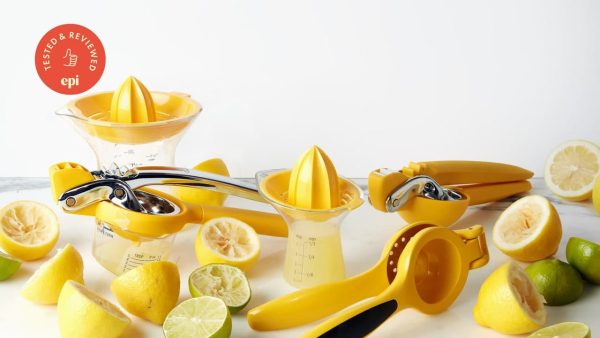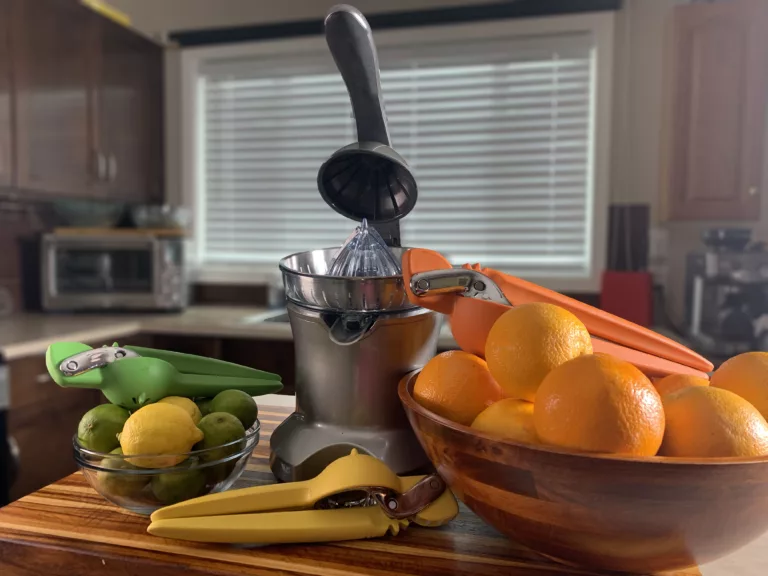Lemon juicers come in two main types: manual and electric. While both serve the same purpose – extracting juice from lemons – they do so in different ways. Manual lemon juicers require physical effort as you press and twist the fruit against a reamer to extract the juice. On the other hand, electric lemon juicers do the work for you with a motor that spins the reamer automatically. Each type has its own advantages and disadvantages, so let’s take a closer look at the differences between manual and electric lemon juicers.
Review contents
Design
Manual lemon juicer design
When it comes to design, manual lemon juicers typically have a simpler and more straightforward design compared to their electric counterparts. Manual juicers are usually handheld devices consisting of a bowl or cup-shaped receptacle to hold the lemon, a perforated juicing cone, and a lever or handle for applying pressure. The design is often ergonomic, with a comfortable grip and a stable base to prevent slippage during juicing. Manual juicers are commonly made from durable materials such as stainless steel or high-quality plastics, ensuring their longevity and ability to withstand the rigors of juicing citrus fruits.
Electric lemon juicer design
Electric lemon juicers, on the other hand, feature a more complex design incorporating an electric motor that automates the juicing process. They often come in the form of countertop appliances, resembling a miniature blender or juicer. Electric juicers usually consist of a juicing cone or reamer, a motorized arm or press, and a collection container for the juice. These juicers may also have additional features such as adjustable pulp control, multiple juicing cones for different fruit sizes, and built-in filters to separate the seeds and pulp from the juice. Overall, electric juicers provide a more hands-off approach to juicing, allowing for effortless extraction of lemon juice with just the press of a button.
Operation
Manual lemon juicer operation
Operating a manual lemon juicer is quite simple and requires minimal effort. First, cut the lemon in half and place it cut-side down onto the juicing cone of the juicer. Next, firmly press and twist the lemon while applying downward pressure on the lever or handle. The juice will be extracted through the perforations in the juicing cone and collect in the receptacle below. You can continue juicing multiple lemons in quick succession by repeating this process. Manual lemon juicers provide a satisfying hands-on juicing experience and give you complete control over the pressure applied, ensuring every last drop of juice is extracted from the lemon.
Electric lemon juicer operation
Electric lemon juicers offer a more convenient and effortless juicing experience. To operate an electric juicer, start by cutting the lemon in half and placing it on the juicing cone or reamer. The electric motor will automatically engage when you press down on the fruit, applying consistent pressure to extract the juice. The juice will flow into the collection container, ready to be poured. Some electric juicers may even have automated pulp ejection features, reducing the need for manual intervention. The simplicity and speed of operation make electric juicers an ideal choice for those who want to save time and effort in the juicing process.
This image is property of assets.epicurious.com.
Efficiency
Manual lemon juicer efficiency
Manual lemon juicers are renowned for their efficiency in extracting juice from lemons. Due to the manual pressing action, these juicers can exert a higher amount of pressure on the fruit, ensuring maximum juice extraction. The perforations on the juicing cone allow the juice to flow freely while capturing any seeds or pulp. The efficiency of a manual lemon juicer also lies in its ability to juice lemons of various sizes without any adjustments or attachments. Additionally, manual juicers generate minimal heat during the juicing process, preserving the natural flavor and nutritional value of the lemon juice.
Electric lemon juicer efficiency
Electric lemon juicers are designed for efficiency and speed. With their powerful electric motors, these juicers can quickly extract juice from a lemon with minimal effort. The motorized press ensures consistent pressure on the lemon, resulting in a high juice yield. Electric juicers often have multiple speed settings or adjustable pulp control, allowing you to customize the consistency of the juice according to your preference. However, it’s important to note that electric juicers may generate some heat during the juicing process, which can potentially affect the taste and quality of the juice.
Ease of Use
Manual lemon juicer ease of use
Manual lemon juicers are incredibly user-friendly and straightforward. Their simple design and intuitive operation make them accessible to anyone, regardless of their juicing experience. You don’t need to worry about complicated attachments or settings — simply cut the lemon, place it on the juicing cone, and apply pressure using the lever or handle. Manual juicers are lightweight and portable, so you can easily take them with you when camping, picnicking, or even on vacation. Furthermore, manual juicers are easy to clean since they usually consist of detachable parts that can be washed by hand or placed in the dishwasher.
Electric lemon juicer ease of use
Electric lemon juicers offer unmatched convenience and ease of use. With their automated operation, all you need to do is cut the lemon, place it on the juicer, and press down. The electric motor will take care of the rest, ensuring a smooth and effortless juicing process. Electric juicers often have intuitive controls and indicators, allowing you to adjust settings or monitor the juicing progress with ease. However, it’s worth mentioning that electric juicers may require a power source and may not be as portable as manual juicers. Additionally, their more intricate design can make cleaning slightly more involved, but most electric juicers have removable parts that are dishwasher safe for easy maintenance.
This image is property of assets.epicurious.com.
Speed
Manual lemon juicer speed
Manual lemon juicers are not typically known for their speed, as they require manual effort to extract juice from the lemon. However, with some practice and familiarity with the juicer, you can achieve a relatively fast juicing process. The speed of juicing with a manual juicer largely depends on the force applied while pressing and twisting the lemon. While it may take a bit longer compared to electric juicers, manual juicers have the advantage of being able to control the pace of juicing. This allows you to savor the juicing experience and ensure that every lemon is thoroughly juiced.
Electric lemon juicer speed
If speed is a priority, then electric lemon juicers are the way to go. Equipped with powerful motors, electric juicers can extract juice from lemons in a matter of seconds. The electric press applies consistent pressure, resulting in a fast and efficient juicing process. Additionally, electric juicers can handle large quantities of lemons without causing any strain or fatigue. This makes electric juicers a popular choice for those who need to juice a significant amount of lemons quickly, such as in commercial settings or when preparing large batches of lemon-based recipes.
Price
Manual lemon juicer price
One of the significant advantages of manual lemon juicers is their affordability. Manual juicers are generally more budget-friendly compared to their electric counterparts. The simpler design and lack of electric motor contribute to the lower cost of manual juicers. Depending on the brand, materials, and additional features, manual juicers can range from around $10 to $30. They offer excellent value for money, allowing you to enjoy fresh lemon juice without breaking the bank. As an added bonus, manual juicers often come with a warranty, providing peace of mind and ensuring long-term reliability.
Electric lemon juicer price
Electric lemon juicers are typically more expensive than manual juicers due to their advanced features and motorized operation. The cost of electric juicers can vary significantly depending on the brand, motor power, juicing capacity, and extra functionalities. Entry-level electric juicers may be priced around $30 to $50, while high-end models with additional features can range from $100 to $200 or more. Despite the higher price tag, electric juicers offer unparalleled convenience and time-saving benefits, making them a worthy investment for avid juicers or those with frequent juicing needs.
This image is property of www.sizzleandsear.com.
Durability
Manual lemon juicer durability
Manual lemon juicers are often built to last, thanks to their sturdy construction and durable materials. Most manual juicers are made from high-quality stainless steel or robust plastics, ensuring their durability even with frequent use. The simplicity of the design also contributes to the longevity of these juicers. With no complex electrical components, manual lemon juicers can withstand regular juicing without the risk of malfunction or breakdown. By following proper care instructions and avoiding excessive force, a well-maintained manual juicer can serve you for many years, providing consistent and efficient lemon juicing.
Electric lemon juicer durability
Electric lemon juicers are designed with durability in mind, as they need to withstand the demands of motorized operation. While the longevity of an electric juicer can vary depending on the brand and build quality, most reputable models are built to last. The motors are often engineered for durability and can handle juicing large quantities of lemons without encountering issues. Additionally, electric juicers are constructed with materials that are resistant to corrosion and wear. To ensure the longevity of an electric juicer, it’s essential to follow the manufacturer’s recommendations for maintenance and usage, such as avoiding the immersion of the motor unit in water.
Cleaning
Manual lemon juicer cleaning
Cleaning a manual lemon juicer is a breeze due to its simple design and minimal parts. Most manual juicers consist of detachable components that can be easily disassembled for cleaning. After juicing, remove the juicing cone and receptacle, and rinse them under warm water to remove any residual pulp or juice. You can also use a small brush or sponge to clean hard-to-reach areas if necessary. Many manual juicers are also dishwasher safe, allowing for even more convenient cleaning. Once cleaned, make sure to dry all the components thoroughly before reassembling them or storing the juicer, ensuring its longevity.
Electric lemon juicer cleaning
Cleaning an electric lemon juicer requires a bit more effort compared to manual juicers due to their more complex design. However, most electric juicers have detachable parts that are dishwasher safe, making cleaning relatively simple. After juicing, disassemble the juicer by removing the juicing cone, collection container, and any removable filters or strainers. Rinse these components under warm water to remove any leftover pulp or juice. For parts that are not dishwasher safe, such as the motor unit, wipe them down with a damp cloth. Ensure all parts are completely dry before reassembling the juicer or storing it to prevent any moisture-related issues.
This image is property of assets.epicurious.com.
Portability
Manual lemon juicer portability
Portability is a significant advantage of manual lemon juicers. These juicers are compact, lightweight, and often designed with convenient handles or grips, making them highly portable. Whether you’re going on a picnic, camping trip, or simply want to enjoy fresh lemon juice on the go, a manual juicer is the perfect companion. You can easily pack it in your bag or carry it in your hand without much hassle. The absence of any electrical components or need for a power source also adds to the portability factor. Manual lemon juicers allow you to enjoy freshly squeezed lemon juice wherever you are.
Electric lemon juicer portability
When it comes to portability, electric lemon juicers are less convenient compared to their manual counterparts. Electric juicers are designed to be more stationary as they require a power source to operate. While some electric juicers have cordless options or rechargeable batteries, they are still bulkier and heavier than manual juicers. Electric juicers are better suited for countertop use in your kitchen. However, if you’re looking to bring an electric juicer on a road trip or to an outdoor event with access to power, they can still be a viable option. Just remember to ensure you have the necessary power source available.
Versatility
Manual lemon juicer versatility
Manual lemon juicers excel in their simplicity and versatility. While their primary purpose is juicing lemons, they can also be used for other citrus fruits such as limes or small oranges. The manual operation allows you to control the pressure applied, accommodating fruits of different sizes and maximizing juice extraction. Some manual juicers also offer the option to adjust the pulp level, providing flexibility in the juice’s final texture. Beyond juicing, manual lemon juicers can be used for other culinary purposes, such as extracting fresh citrus juice for recipes or infusing beverages with refreshing flavors. Their versatility makes them a valuable addition to any kitchen.
Electric lemon juicer versatility
Electric lemon juicers offer a wide range of versatile features that enhance their functionality. Many electric juicers come with attachments or interchangeable cones to accommodate different fruit sizes, allowing for juicing various citrus fruits with ease. Some models also have adjustable pulp control, enabling you to customize the pulp content of your juice. Electric juicers may even have additional functionalities such as blending or citrus zesting capabilities, expanding their usage beyond simple juicing. The versatility of electric juicers allows you to experiment with different flavors and textures, making them a versatile tool for your culinary endeavors.
In conclusion, whether you choose a manual or electric lemon juicer, you’re sure to enjoy the benefits of freshly squeezed lemon juice. Manual juicers offer a hands-on and affordable juicing experience, while electric juicers provide convenience and speed. Consider factors such as design, ease of use, efficiency, and cleaning when making your decision. Whether you prefer the simplicity of a manual juicer or the automated operation of an electric juicer, both options are sure to elevate your lemon juicing experience. Happy juicing!
This image is property of reviewed-com-res.cloudinary.com.





































